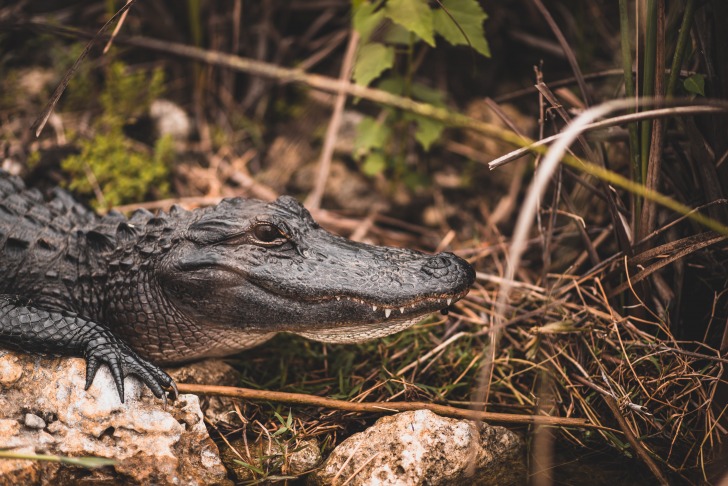The Ozarks are a lot bigger than most people realize.
Stretching over five states, the Ozarks cover a vast amount of territory.
Because of how varied the land is, there are all kinds of creatures that can be found.
What about the waterways, though?
The lakes and rivers are popular places to hang out, fish, and even go boating.
With all the possibilities, some may be afraid that something more sinister is lurking in the water.

Contents
So… Are There Alligators in the Ozarks?
Yes and no.
The Ozarks, also known as the Ozark Mountains or the Ozark Plateau, span five states.
They go as far east as Illinois and west as Kansas, with a majority in Arkansas and Missouri.
Technically, there have been sightings of alligators in the Ozarks.
Whether or not there is a possibility of coming across one depends on what state you’re in.
If you’re heading down the Ouachita River, in Central Arkansas, you’d have a higher possibility.
There have also been several reported sightings at the Lake of the Ozarks in Missouri.
However, these reports are most likely gators who have gone astray.
An alligator’s natural habitat typically extends only throughout the southeastern United States.
Officially, they can be found as far west as eastern and southeastern Texas, and central to southern parts of Arkansas.
The majority of the alligator population can be found in Georgia and Florida.
That’s quite a long way from the Ozarks.
So, the likelihood of you finding any alligators in parts of the Ozarks that aren’t in Arkansas is pretty low.
More on that later.
Alligator Species in the Ozarks
There are only two kinds of alligators roaming in the wild.
There is the Chinese alligator, found in China, and the American alligator found in, you guessed it, North America.
They live close to rivers, lakes, swamps, and other freshwater bodies.
Since they are cold-blooded, they like to pretty much stay in warm climates.
That’s why finding them north of Arkansas isn’t very likely.
Is it Safe to Swim in the Ozarks?
The Ozarks is a National Park, so you should always check in with the Department of Fish and Wildlife before exploring a new part of the Ozarks.
The easiest way to find out information about where you’re going is at the visitor’s center.
When entering the park, check water conditions and ask if there have been any recent reported sightings of any sort of predator.
Also, a good rule of thumb is to do research on any area that you are planning to hang out or vacation in.
It’s always helpful to know every detail you can find out about areas that might be affected by alligators.
With that being said, the Lake of the Ozarks is incredibly safe and monitored.

Interesting Alligator Facts
- 13 alligators were stolen from an alligator farm in Hot Springs, Arkansas, in May of 2021.
- Alligators have the ability to regrow lost, misplaced, or stolen teeth.
- Unfortunately, there is one thing the T-Rex and the alligator do not have in common. That is, if you stand still, the alligator can still find and attack you.
- Couples all over the world wish that they knew or could even determine the sex of their child, but that comes easily for alligators. Their offspring’s sex is determined by temperature. If it’s warm, then there will be males. If it’s cool, the babies will be female. It brings new meaning to the lyric, “She’s a cold-hearted snake,” also gator.
- If you see a gator in the wild, run. By run, we mean run as fast as you can! These reptiles can run up to 35 mph, but don’t worry about outrunning them. They don’t have enough endurance to keep that speed for very long.
- While taking a nightly stroll through the swamp, if you happen to catch a couple of glowing red eyes in your flashlight, don’t worry! It’s not a demon. It just so happens to be your friendly swamp gator. Actually, maybe not so friendly, come to think of it.
- Alligators don’t just eat meat. They get their daily dose of fiber as well. They are known to eat fruit and veggies, and not by accident. They will search for this dietary staple on their own.
- If you think that gators are hiding in louder, fast-moving water to help them mask their attack, think again. They actually thrive in still or slow-moving water. That just goes to show how great hunters they are because they sneak up on you when it’s absolutely quiet.
- Now, they may be silent hunters, but when it comes to mating, not so much. They are known as the loudest reptiles in the world. During mating, their calls can get as loud as 90 decibels, which is about the same as a lawnmower! Which makes it impossible to hide what they are doing from their roommates.
Alligators vs. Crocodiles
Lots of people confuse alligators and crocodiles, and to be fair, they are closely related.
However, there are many distinct differences between the two.
While alligators, as we mentioned earlier, are only found in the United States and China, crocodiles can be found in several different countries, like Asia, Africa, and South America.
The likelihood of you ever seeing or coming across a crocodile in the United States is extremely low.
There are only one species of crocodile that is found in the States, and that is the American crocodile.
While the American alligator only reaches about 15 feet in length, the American crocodile can reach a length of 20 feet or even longer.
They are found on the southern tip of Florida and the Bahamas and have even been found as far south as Peru and Venezuela.
The physical characteristics of the two are noticeably different.
The alligator has a shorter, stubbier nose with a rounded snout.
Also, they have a bit of an overbite.
Their upper jaw has small depressions for the teeth on their lower jaw, so when they close their mouths, you only see a few teeth from their upper jaw.
Crocodiles, on the other hand, have upper and lower jaws that are the same length, so when they close their mouths, you see all of their teeth, giving them a ferocious, almost evil-looking grin.
Also, they have a longer pointier snout.
Another difference is their habitats.
While alligators live close to lakes, rivers, and swamps where fresh water is abundant, crocodiles can live in both fresh and saltwater habitats.
While alligators have been known to attack humans, it is extremely rare, with gators preferring to stray away from humans.
Their usual prey tends to be fish, turtles, and small mammals such as beavers and muskrats.
Crocodiles, on the other hand, are much more aggressive.
On average, there are as many as 1000 deaths reported per year from crocodile attacks.
Their diet has a wide range, from large fish to deer and buffalo, and they have even been known to attack sharks and even lions!
Even though they aren’t the largest of the species, the Nile crocodile is the deadliest, with more than a third of the 1000 deaths per year being pinned on them.
So, in Egypt, it’s probably best not to go swimming in the river.
3 Safety Tips for Swimming in Alligator-infested Waters
1. No Splashing Around
Alligators are attracted to the sound of splashing water.
This is because, instinctively to them, it means there is an injured fish or some form of small mammal that has waded into the water, and this means easy prey for them.
They don’t differentiate prey, and once they bite and clamp down, as you start to struggle, they will begin their death roll.
This is where, after getting a grip, they begin to spin their entire body over and over in an attempt to disorient their prey, making it difficult for them to escape, and in a lot of cases, drowning them.
2. Watch What You Eat
If you are near a body of water where alligators have been known to swim, it’s best not to have any food nearby.
Alligators have an excellent sense of smell and will try to track down the source of food.
Also, not to make a joke, but the whole waiting an hour after eating thing is also a good rule of thumb.
The last thing you want to happen to you while trying to escape an alligator in the water is to cramp up.
You’ll need all the energy and strength you must get away.
3. Pay Attention to Signs
Look for any posted signs in the area that might warn you of any nearby alligator activity.
Always check local visitor centers at any state or national park.
They will have info about safe areas to venture into the water.
Frequently Asked Questions
Could alligators survive in the Missouri part of the Ozarks?
Technically, alligators shouldn’t be showing up in Missouri, even in the Ozarks.
Not only are they not native to the area, but it would be hard for them to prosper.
Unlike some sharks that are adaptable to colder weather, alligators don’t have that ability.
Alligators are more likely than crocodiles due to temperature, but not that cold.
If a rogue alligator made its way that far north, it would most certainly fly south for the winter.
When are you most likely to see an alligator?
There are many sides to that coin.
It’s hard to see them at night.
Unless, of course, there is a full moon.
Even at night, they’re not traveling.
So, if you have a camera with night vision, set it up where you know alligators to be.
It’s possible you’ll see a little jot here and there, but you’re more likely to see the mouth open.
Alligators don’t nitpick over their food options; they will chow down on whatever comes their way.
What do alligators do at night?
Not a whole lot, to be honest.
By that, we mean the majority of their activities.
That sounds confusing, but the reason it can be classified that way is because of how they hunt.
Alligators’ favorite way of hunting comes down to playing the long game.
They like to sit and wait.
Patience is definitely a virtue that alligators were born with.
Perhaps that’s why they haven’t changed at all in the millions of years they’ve existed.
They wait for prey all night to take the perfect bite.












Alligators in Missouri? And how exactly, without people providing/caring for then, can they survive our winters?
Pretty sure the author said it’s highly unlikely to see gators in Missouri. Did you read the article?